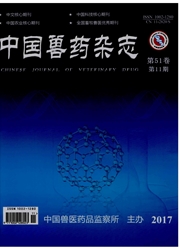

 中文摘要:
中文摘要:
对贵州省规模化养猪场的167株大肠杆菌进行16SrRNA甲基化酶基因的流行及转移情况研究,为氨基糖类药物在兽医临床上的合理使用提供理论参考。采用微量肉汤稀释法测定药物敏感性,聚合酶链反应(PCR,Polymerase Chain Reaction)方法检测16SrRNA甲基化酶基因的携带和转移。结果显示,阿米卡星、卡那霉素、链霉素、庆大霉素、新霉素的平均耐药率分别为17.5%、67.8%、80.9%、77.67%和75.33%。检测到rmt B 8株,检测率为4.8%,未检测到arm A。由此可知,rmt B基因可转移至沙门氏菌和大肠杆菌,转移之后的菌株对大部分抗菌药物耐药水平大幅提高。
 英文摘要:
英文摘要:
The object was 167 strains E. colis of the large- scale pig farms in Guizhou, explored the prevalence of 16SrRNA methylation enzyme gene and transfered research, to provide theoretical basis for the rational use of aminoglycosides. Application of trace the broth dilution method to determine the sensitivity of drugs and polymerase chain reaction (PCR) to detect 16S-RMTase genes" carry and transfer. The average resistance rates of amikacin, kanamycin, streptomycin, gentamicin, neomycin was 17.5 % ,67.8 %, 80.9 %, 77.67% and 75.33% respectively. 8 strains of rmtB were found and the detection rate was 4.8%, armA was not detected. Therefore, rmtB gene can be transferred to the salmonella and E. coli, and strain resistance level increased significantly after the transfered.
 同期刊论文项目
同期刊论文项目
 同项目期刊论文
同项目期刊论文
 期刊信息
期刊信息
